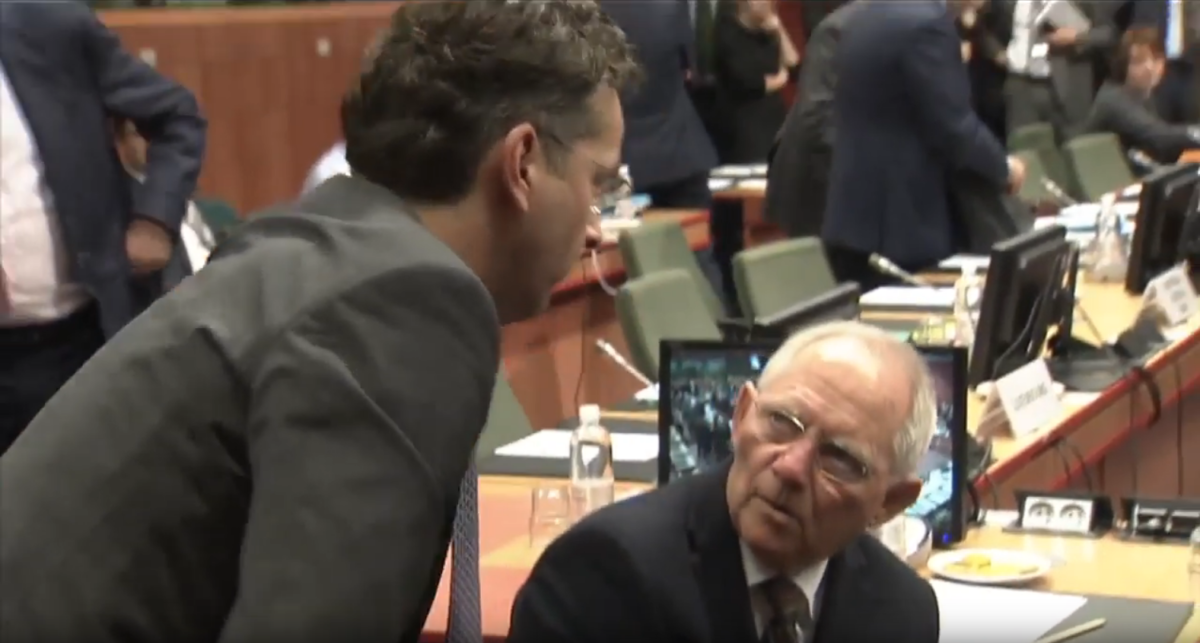Junker-Moscovici draft:
15 Feb – close of business
Today, the Eurogroup took stock of the current situation in Greece, based on intensive dialogue between the new Greek authorities and the Institutions.
The Greek authorities have expressed their commitment to a broader, socially just and stronger reform process aimed at durably improving growth prospects. In particular, the Hellenic Government commits to implementing long overdue reforms to tackle corruption and tax evasion, and upgrade the public administration. It announced its intention to take urgent action to ensure a fairer and more effective tax system and to contain the humanitarian crisis. It will ensure that any new measures do not reverse existing commitments and are fully funded. It will refrain from unilateral action and will work in close agreement with its European and international partners.
Greece will fully respect its commitments to partners to ensure sound and sustainable public finances, by reaching and then sustaining sizeable primary balances. The feasibility of reaching the fiscal target for 2015 will be considered in light of evolving economic circumstances. Measures for reducing the debt burden and achieving a further credible and sustainable reduction of the Greek debt-to-GDP ratio should be considered in line with the commitment of the Eurogroup in November 2012.
At the same time, the Greek authorities reiterated their unequivocal commitment to the financial obligations to all their creditors. The above forms a basis for an extension of the current loan agreement, which could take the form of a [four-month] intermediate programme, as a transitional stage to a new contract for growth for Greece, that will be deliberated and concluded during this period.
When considered useful, the European Commission will provide technical assistance to Greece to strengthen and accelerate the implementation of reforms. The Eurogroup invites the Institutions to continue technical work with the Greek authorities, including to identify intermediate financing needs, how they will be covered and the appropriate conditionalities. The Institutions will report to the Eurogroup by [21] February.
—
Dijsselbloem draft here:
16 February 2015 [14:45]
Preliminary and confidential
[Draft] Eurogroup statement on Greece
The Eurogroup reiterates its appreciation for the remarkable adjustment efforts undertaken by Greece and the Greek people over the last years. Over the last week, the Eurogroup and the institutions have engaged in an intensive dialogue with the new Greek authorities.
The Greek authorities have expressed their strong commitment to a broader and deeper reform process aimed at durably improving growth and employment, prospects, [enhancing social fairness] and ensuring stability and resilience of the financial sector. In particular, the Greek authorities commit to implementing long overdue reforms to tackle corruption and tax evasion, and improving the efficiency of the public administration. At the same time, the Greek authorities reiterated their unequivocal commitment to honour their financial obligations towards all their creditors. The Greek authorities will make the most efficient use of the continued provision of the technical assistance.
We discussed the policy priorities of the new government on the basis of work undertaken by the institutions and the Greek authorities. We welcomed that in a number of areas the Greek policy priorities can contribute to a strengthening and better implementation of the current financial assistance programme. The Greek authorities have indicated that they intend to successfully conclude the programme, taking into account the new government’s plans. In this context, we intend to make the best use of the existing built-in flexibility in the current programme. The Greek authorities gave their firm commitment to refrain from unilateral action and will work in close agreement with its European and international partners, especially in the field of the tax policy, privatization, labour market reforms, financial sectors, and pensions.
The Greek authorities committed to ensure appropriate primary fiscal surpluses and financing in order to guarantee debt sustainability in line with the targets agreed in the November 2012 Eurogroup statement. Moreover, any new measures should be funded, and not endanger financial stability.
On this basis, the Greek authorities expressed their intention to request a six months technical extension of the current programme as an intermediate step. . This would bridge the time for the Greek authorities and the Eurogroup to work on a follow-up arrangement. We also agreed that the IMF would continue to play its role in this new arrangement. The Eurogoup is favourable disposed to such a request by the Greek authorities.
Moreover, we were informed by the EC, the ECB and the IMF that it would be prudent to extend the availability period of the EFSF bonds in the HFSF buffer for six months, in parallel to the extension of the EFSF programme. The Eurogroup looks favourably at such an extension. Following a request by Greece, the EFSF can make the necessary arrangements. The Eurogroup emphasizes that these funds can be used for bank recapitalization and resolution costs and will only be released on the basis of an assessment by the institutions and a decision of the Eurogroup.
We remain committed to provide adequate support to Greece until it has regained full market access as long as it honours its commitments within the agreed framework.
Do you believe that citizens deserve to know about these kinds of high-stakes negotiations? Sign our petition to #LetLightIn in our institutions. And if you can, support our work by donating here.

